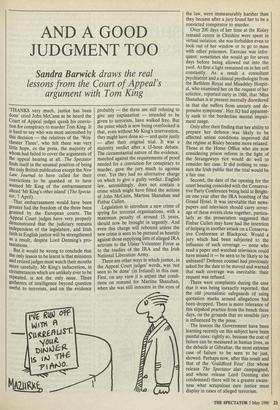AND A GOOD JUDGMENT TOO
Sandra Barwick draws the real
lessons from the Court of Appeal's argument with Tom King
'THANKS very much, justice has been done' cried John McCann as he heard the Court of Appeal judges quash his convic- tion for conspiracy to murder Tom King. It is hard to say who was most astonished by this decision — the relatives of the 'Win- chester Three', who felt there was very little hope, or the press, the majority of whom had failed to cover the arguments of the appeal hearing at all. The Spectator finds itself in the unusual position of being the only British publication except the New Law Journal to have called for their convictions to be quashed or to have warned Mr King of the embarrassment ahead `Mr King's other island' (The Specta- tor, 7 April). That embarrassment would have been greater had the freedom of the three been granted by the European courts. The Appeal Court judges have very properly demonstrated that the judiciary remains Independent of the legislature, and Irish faith in English justice will be strengthened as a result, despite Lord Denning's pro- testations.
But it would be wrong to conclude that the only lesson to be learnt is that ministers and retired judges must watch their mouths more carefully. Mr King's indiscretion, in circumstances which are unlikely ever to be repeated, is not the only issue. Three gatherers of intelligence beyond question useful to terrorists, and on the evidence probably — the three are still refusing to give any explanation — intended to be given to terrorists, have walked free. But the point which is now being overlooked is that, even without Mr King's intervention, they might have done so — and quite justly — after their original trial. It was a majority verdict after a 15-hour debate. The circumstantial nature of the evidence, matched against the requirements of proof needed for a conviction for conspiracy to murder, gave the jury much to agonise over. Yet they had no alternative charge on which to give a guilty verdict. English law, astonishingly, does not contain a crime which might have fitted the actions of John McCann, Martina Shanahan and Finbar Cullen.
Legislation to introduce a new crime of spying for terrorist organisations, with a maximum penalty of around 15 years, should now be brought in urgently. And even this charge will rebound unless the new crime is seen to be pursued as heartily against those supplying lists of alleged IRA activists to the Ulster Volunteer Force as to the toadies of the IRA and the Irish National Liberation Army.
There are other ways in which justice, in the Appeal Court judges' words, was 'not seen to be done' (in Ireland) in this case. First, on any view it is unjust that condi- tions on remand for Martina Shanahan, when she was still innocent in the eyes of the law, were immeasurably harsher than they became after a jury found her to be a convicted conspirator to murder.
Over 200 days of her time at the Risley remand centre in Cheshire were spent in virtual isolation: she was forbidden even to look out of her window or to go to mass with other prisoners. Exercise was infre- quent: sometimes she would go for seven days before being allowed out into the yard. At first a light remained on in her cell constantly. As a result a consultant psychiatrist and a clinical psychologist from the Bethlem Royal and Maudsley Hospit- al, who examined her on the request of her solicitor, reported early in 1988, that 'Miss Shanahan is at present mentally disordered in that she suffers from anxiety and de- pressive symptoms'. Her IQ had apparent- ly sunk to the borderline mental impair- ment range.
Only after their finding that her ability to prepare her defence was likely to be affected unless conditions improved did the regime at Risley became more relaxed. Those at the Home Office who are now considering prison reform in the light of the Strangeways riot would do well to consider her case. It did nothing to reas- sure the Irish public that the trial would be a fair one.
Second, the date of the opening for the court hearing coincided with the Conserva- tive Party Conference being held at Bright- on one year after the IRA bombing of the Grand Hotel. It was inevitable that news- papers and television should carry cover- age of these events close together, particu- larly as the prosecution suggested that Finbar Cullen may have had the intention of helping in another attack on a Conserva- tive Conference at Blackpool. Would a jury which had been subjected to the influence of such coverage — none who read a paper and watched television could have missed it — be seen to be likely to be unbiased? Defence counsel had previously asked for the date to be moved and warned that such coverage was inevitable: their request was refused.
There were complaints during the case that it was being inexactly reported, that the old journalistic safeguards of using quotation marks around allegations had been dropped. There is more tolerance of this slipshod practice from the bench these days, on the grounds that no sensible jury is influenced by the press.
The lessons the Government have been learning recently on this subject have been painful ones: rightly so, because the cost of failure can be measured in human lives, as the debacle at Gibraltar, the most extreme case of failure to be seen to be just, showed. Perhaps now, after this result and that of the 'Guildford Four' (for whose release The Spectator also campaigned, and whose release Lord Denning also condemned) there will be a greater aware- ness what scrupulous care justice must display in cases of alleged terrorism.


















































 Previous page
Previous page